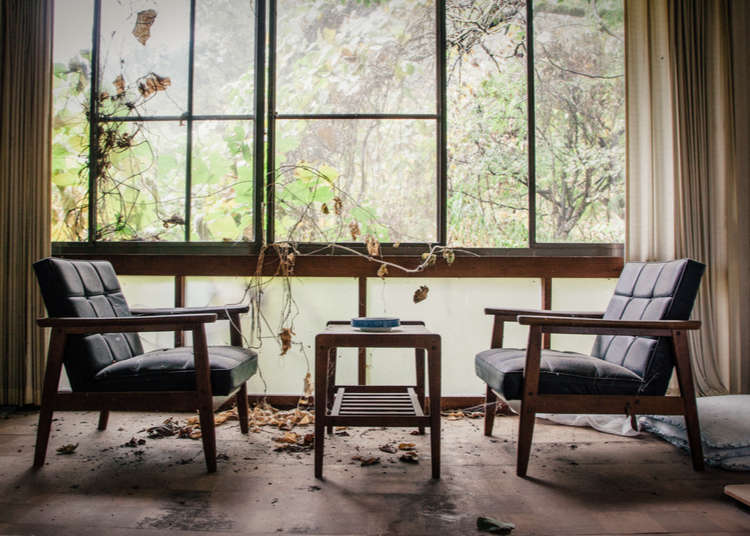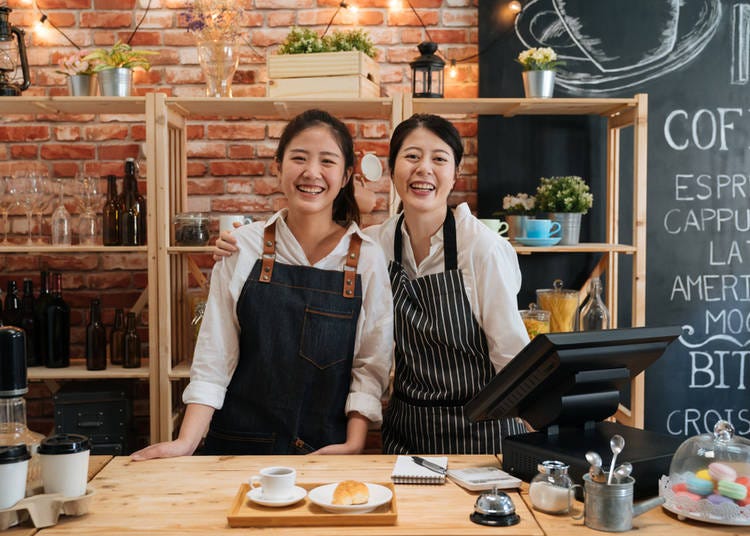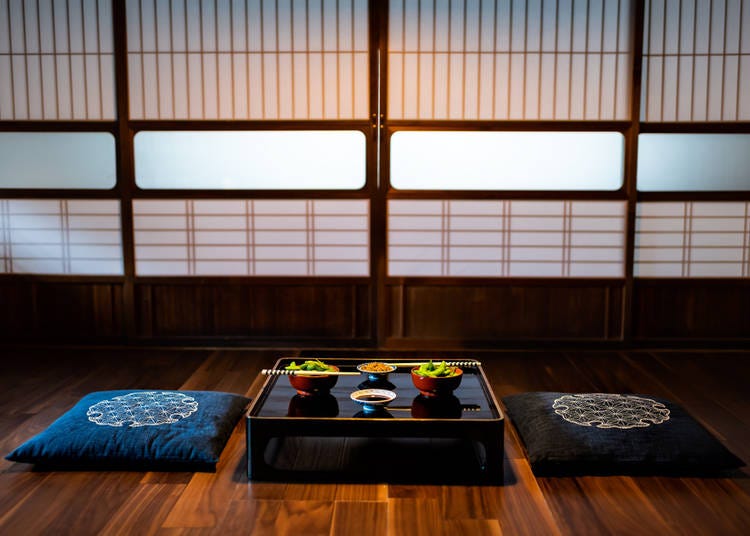
These Are Some of the Weirdest Stories We've Heard About Japanese 'Omotenashi'
- Written by: David McElhinney
Omotenashi, one of Japan’s many untranslatable terms, is often roughly defined as ‘hospitality’. But it is more than just that: It refers to the truly flattering levels of customer service one expects to receive. Japanese culture dictates that, as the customer, your needs are not just put first, but they are deemed to be of paramount importance - almost at any cost.
But is this always the case?
We asked visitors to Japan to share with us some of their most unusual hospitality experiences here. From common misunderstandings and hospital oddities to height problems and terrifying pizzas, there were more than a few surprises in store.
Of course, with only eight interviewees, this isn't representative of the larger tourist experience, but involves some funny and weird stories nonetheless!
(Opinions are based on those interviewed.)
- Table of Contents
-
- 1. Hospital service in a vending machine...? (Helen, New Zealand, 42)
- 2. Why are they shouting at me?! (David, U.K, 26)
- 3. A different menu? (Michelle, Australia, 40)
- 4. I’m too tall! (Dalton, USA, 28)
- 5. I can’t sit and chat? (Dalton, USA, 28)
- 6. They just disappeared... (Sarah, New Zealand)
- 7. Are you sure this is pizza? (Kate)
- 8. Why won’t you talk to me?! (Cassie, UK, 25)
- Any advice?
1. Hospital service in a vending machine...? (Helen, New Zealand, 42)

Helen had a very bizarre experience with the Japanese emergency services. “My husband broke his clavicle in Shiga Kogen last Friday. He was taken to Nagano hospital and had to purchase a sling from the vending machine,” she told us.
Shocked, we asked to find out more. “He saw the humor in it!” she replied. “He paid for the sling and the visit, also including 145 dollars for the X-ray that he was initially barred from seeing... He’s a doctor in Australia and was surprised by some of the idiosyncrasies present in the Japanese health care system.” Such idiosyncrasies are not so common in Japanese hospitals, but it was certainly one of the most unusual stories we had heard.
Usually in Japanese hospitals you can expect similar levels of care as you would get elsewhere in the developed world. And in major cities you may even get doctors that speak English. For more on what to do if you get sick in Japan, check out our handy guide.
2. Why are they shouting at me?! (David, U.K, 26)

David came across the number one most common misunderstanding with Japanese hospitality. “Every time I walked into the supermarket or convenience store the staff would all say something. I had no idea what they were saying or if I was supposed to reply.”
In Japan, when entering establishments, the staff will often say in unison, “Irasshaimase.” This is basically a polite way of welcoming customers. There is no expectation that you should reply with a greeting of your own. Sometimes one member of staff will shout it, and the rest will follow as a collective greeting. At the end of the meal they may do the same again with “arigatou gozaimashita” (“thank you very much”).
David told us, “I have since learnt that this ‘irasshaimase’ is just a welcoming call of sorts. I actually kind of miss people welcoming me to shops when I leave Japan.”
3. A different menu? (Michelle, Australia, 40)

Michelle’s mishap came in the form of restaurant menu troubles. “The only minor negative we had was when we went to an izakaya restaurant where we were given an 'English' menu. It was different to the Japanese menu. They had basically taken out all of the spicy foods thinking we would not like them.”
There is an impression sometimes that foreigners will not like certain Japanese foods, especially things that focus on spice, fish innards, and parts of animal that other countries often cast asunder.
We pressed Michelle on how she dealt with the issue. “I then referred to the Japanese menu with my little knowledge of Japanese and asked to order things off the other menu. It was a shame it was different. It's such a minor negative, but the only real one we came across in Japan.”
It’s worth noting that this case is somewhat of an exception. Usually restaurant menus will be directly translated, resulting in some funky English at times, but typically consisting of the same dishes as the Japanese version.
4. I’m too tall! (Dalton, USA, 28)

Dalton is tall, and in Japan that can sometimes cause problems. His bizarre experience happened in a place that is, by nature, rife with oddities: Disneyland. “They do take the time for "tall" people to seat you on rides before you wait in line,” he told us. “They didn't let me ride because I was too tall for one!”
Though initially annoyed, it seemed to work out okay for Dalton in the end. He said, “I pushed and pushed to see if I could break that "discipline". I could not. I actually waited in line for a different ride while my girlfriend rode the one I couldn't.” So, no need to be too perturbed if you’re a fellow tall person!
This particular case is likely a safety issue. Particularly in theme parks, there are special fixtures and decorations that could potentially cause a problem if you’re over a certain height – you’ll likely find these restrictions elsewhere in the world too! It’s a good testament to Japan’s commitment to safety that they didn’t let him on in the end.
5. I can’t sit and chat? (Dalton, USA, 28)

Dalton’s travails didn’t end at Disneyland however. “Regarding dining, we were in five different cities - if not more - during our trip,” he told us. “Sitting and chatting after a meal felt strange; like you are there only to eat. I guess it made me more mindful of my time and how it affects others.”
Japanese restaurants are very busy due to the high-quality food. Sometimes this means they rather you didn’t linger too long after finishing your meal. If you want to talk the night away, izakayas are better options.
Hospitality issues notwithstanding, Dalton reports mostly good things from Japan: “I would travel back there in a heartbeat. Highlight of my life as of now”. High praise indeed, which reflects the attitudes of most visitors to the Land of the Rising Sun.
6. They just disappeared... (Sarah, New Zealand)

Sarah’s bizarre hospitality experience sounds like the beginning of a cheap horror flick, but thankfully there were no gruesome endings. She tells us, “On my last trip we stayed at a ryokan in Hakone for a night, and after dinner the owners just disappeared. We couldn't find a way to ask to use the onsen and we didn't see anyone else again until right before we left the next day. It was really eerie.” Eerie indeed.
We were intrigued to know if this was Sarah’s first experience with disappearing hosts. “I have never had that happen to me before. Especially since the disappeared so early in the night as well and didn't emerge until late morning. I loved the trip to Japan, but it made staying at such a beautiful ryokan quite underwhelming.”
Ryokan are typically the most welcoming of Japanese accommodation options, with owners/staff who fuss over your every movement. Just so you’re aware that ellusive management isn’t par for the course.
7. Are you sure this is pizza? (Kate)

The Japanese are typically wonderful hosts, yet Kate’s story will no doubt be familiar with any people who have been afraid to offend their generous hosts. “We got served pizza, a hugely expensive one, as a treat.... and had to force it down as it had wedges, raw egg and corn on it....”
Japanese cuisine may be a continuous exhibition of culinary masterclass in action, yet pizza is one thing they’ve taken in their own unique direction. There are some great pizza spots in Tokyo and other major cities, but whilst your in Japan, why not zone in on the local cuisine?
Kate realized she was in between a rock and hard place however. “After deliberately saying how much we were missing pizza, and knowing the hosts would try to solve our problem, we had to grin and force it down!”
8. Why won’t you talk to me?! (Cassie, UK, 25)

This one might strike a chord with many non-Japanese from Asian countries who have spent time in the Land of the Rising Sun. Cassie is Caucasian and was out with her Asian friend in a Tokyo restaurant. “The staff kept talking to my Asian-looking friend instead of me,” she told us. “Even though she couldn’t speak Japanese and I could.”
Cassie was persistent however, and eventually... she got the point across. “I told them she couldn’t speak Japanese, but they still tried to direct questions to her anyway. I just had to keep answering regardless, and they finally started looking my way!”
Sometimes staff will try to talk to you in English, even if their abilities are limited. But don’t let language barriers put you off too much, more often than not waiters and waitresses will try to accommodate you in spite of communication difficulties.
Any advice?
Japanese customer service is globally-renowned, and for good reason: the people are polite, the service is efficient, and your needs as the customer will always be put first. Yet nothing is perfect. So, here are a couple of things to be aware of if you’re a first-time traveler to Japan:
・Rural hospitals and service centers are not always the best provisioned. It doesn’t necessarily reflect accurately on Japan as a whole.
・Staff members will say ‘irasshaimase’ when you enter their establishments. Don’t feel like they are expecting you to reply. In fact, it may be odd to do so.
・In restaurants you may receive a different menu than Japanese customers. Don’t worry, staff will usually try to accommodate you if you’d like to see both English and Japanese menus. It’s rare that the contents of the menus will be different, though, so don’t feel like you need to check every time!
・If you are tall, unfortunately, certain things may be unavailable to you – like Disneyland rides. Other things may just be difficult, like finding a yukata in your ryokan that fits you.
・General eating and hospitality habits of locals may be different from what you’re used to. Expect the unexpected!
Keep these in mind and you’re unlikely to run into problems, but even if you do, perhaps it'll be a fun story to take home!
David is a Northern Irish freelance writer living in Tokyo. He loves living in Japan, reading about Japan, writing about Japan and eating Japanese food. He also spends a lot of time exercising, playing rugby and risking a litany of muscle-related injuries in yoga class.
*Prices and options mentioned are subject to change.
*Unless stated otherwise, all prices include tax.
Popular Tours & Activitiess
Recommended places for you
-

ISHIDAYA Hanare
Yakiniku
Kobe, Sannomiya, Kitano
-
Appealing

Rukku and Uohei
Izakaya
Sapporo / Chitose
-

Jukuseiniku-to Namamottsuarera Nikubaru Italian Nikutaria Sannomiya
Izakaya
Kobe, Sannomiya, Kitano
-

Kambei Sannomiyahonten
Yakiniku
Kobe, Sannomiya, Kitano
-

Kanzenkoshitsuyakinikutabehodai Gyugyu Paradise Sannomiya
Yakiniku
Kobe, Sannomiya, Kitano
-
Goods

Yoshida Gennojo-Roho Kyoto Buddhist Altars
Gift Shops
Nijo Castle, Kyoto Imperial Palace
-
Ad

What Makes Japanese Yakiniku So Darn Good? Guide to Cuts, Heat, and Wagyu Know-How
-

A New Tokyo Landmark Is Coming in 2026, and It's Built for Modern Travelers
by: Guest Contributor
-

Top 3 OSHI MAPs for the Best Matcha and Sweets in Tokyo
by: Guest Contributor
-
Ad

Japan’s Land of Yokai Monsters and Spooky Stories! A Deep Journey to Mysterious San’in (Tottori & Shimane) for Seasoned Travelers
-
Ad

The Whisper of a 1,300-Year-Old History: Meet the Other Face of Nara at Night
by: Shingo Teraoka
-

Where to Buy a Japanese Kitchen Knife? Why Travelers Choose MUSASHI JAPAN's 14 Stores in Tokyo, Kyoto, and Nara
by: Guest Contributor
-

Japan’s Peak Beauty! The Stunning Scenery of Kansai
by: Steve Csorgo
-

A Guide to Tokyo Nightclubs
-

5 Quirky Snacks in Sendai You Won’t Be Able to Live Without
-

Kiyomizu-dera Temple: Guide to Visiting Kyoto's Most Famous Sightseeing Spot
-

Ueno Station Area Guide: Fun Ways to Explore Tokyo's Popular Destination (Area Map & Sightseeing Tips)
-

Iwate Bucket List: 20 Best Things to Do in Iwate Prefecture For Tourists (Attractions, Food, Activities)
- #best sushi japan
- #what to do in odaiba
- #what to bring to japan
- #new years in tokyo
- #best ramen japan
- #what to buy in ameyoko
- #japanese nail trends
- #things to do japan
- #onsen tattoo friendly tokyo
- #daiso
- #best coffee japan
- #best japanese soft drinks
- #best yakiniku japan
- #japanese fashion culture
- #japanese convenience store snacks













